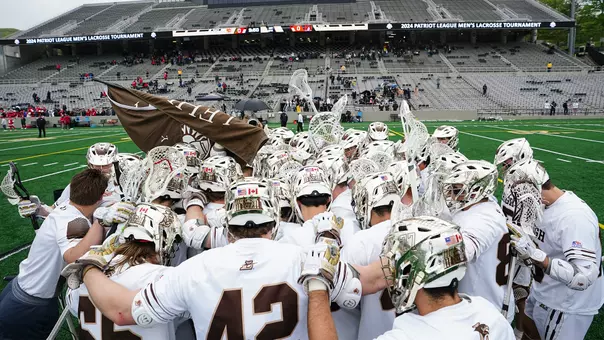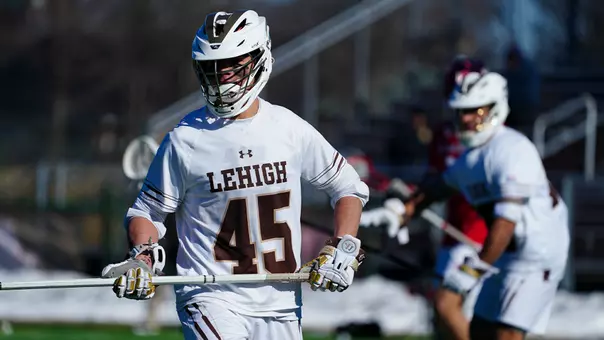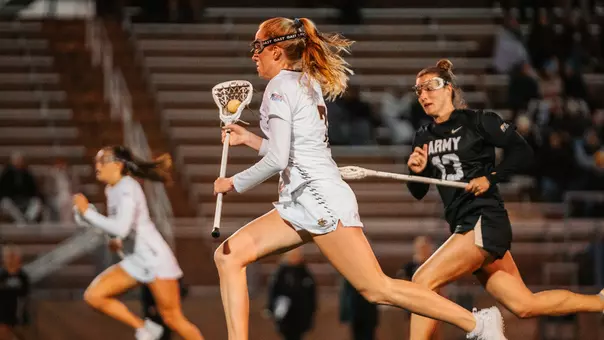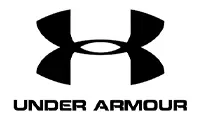Lehigh University Athletics
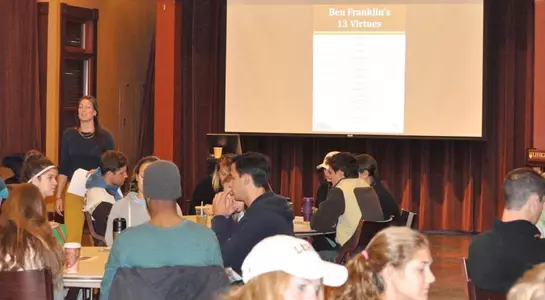
Leadership in Action
12/17/2013 11:01:00 AM | Field Hockey, Athletics, Men's Lacrosse, Men's Rowing, Women's Lacrosse, Women's Rowing, Women's Soccer, Student Athlete
There's much more to the Lehigh student-athlete experience than solely playing a sport. For all the physical gifts an individual may have, that talent could go to waste if the building blocks for success aren't in place.
Time spent preparing, both mentally and physically, pays major dividends.
That's where Director of Athletics Leadership Education Julie Sterrett '07 comes in. The former standout softball player has made a difference in student-athletes' lives, instilling a foundation of success not only for the present, but also for the future.
"Leadership development is about drawing out the greatest strength of each individual; all you need is a spark," said Sterrett. "By enhancing self-awareness and interpersonal skills, we are giving our athletes the opportunity to catalyze positive change among teammates, ultimately resulting in the achievement of team goals."
<%--Athletics Leadership Development Gallery--%>
Along with playing their sport at a high level and receiving a top-notch education, Lehigh student-athletes have the opportunity to develop personally and professionally.
"Our goal is to develop confident and competent leaders for life," said Sterrett. "Practicing effective leadership can give our teams a competitive edge when leaders hold themselves and others accountable to higher standards. Sport is an incredible vehicle for teaching leadership lessons and skills that have the potential to change their lives.
"It's not just a bunch of fluffy, inspirational words," she continued. "I think our kids know that leadership is behavioral and requires independent thinking, thoughtful planning, selfless action, grit and regular reflection and assessment."
Sterrett coordinates and facilitates comprehensive leadership programming that includes opportunities for education, involvement and consulting. The full-time commitment to these services is distinctive and continues to make a difference on the field, in the classroom and in life after college.
"What Julie teaches can be applied in the real world," said football senior linebacker Nigel Muhammad who has extensive experience in all facets of Sterrett's programs. "Whenever you work with people, you need to spread your ambition and goals to your team. It's imperative that you not only get your message across, but also get it across in a way that motivates people."
Here is an overview of the services offered by the Cable Center for Athletics Leadership (made possible through the generous endowment by the late John A. Cable '45) and a glimpse into how they are making a difference now, while also developing a framework for success in the future.
EDUCATIONAL PROGRAMMING
The education wing of the leadership programs focuses on learning leadership concepts and skills.
The four-tiered program begins with the Lehigh P.R.I.D.E. program which is required for all first-year student-athletes in the fall semester and optional in the spring semester. This program aides the transition from high school to college and encourages first year student-athletes to effectively lead themselves before leading others.
"All the workshops are led by Student-Athlete Mentors (explained further under involvement opportunities) who set the expectation for first year student-athletes that it's their personal responsibility to own their leadership development process," said Sterrett. "The fall program content focuses on how to get your feet on the ground academically, define success for yourself as a college student-athlete and connect with helpful resources."
"The P.R.I.D.E. program helped me understand the qualities that a leader needs to possess while also explaining that everyone can be a leader in some regard," said sophomore Harley Abrams of the men's golf team. "The team captains aren't the only ones responsible for leading."
Sophomore and junior student-athletes interested in learning more about leadership may participate in the fall Emerging Leaders program, which focuses on the keys to leadership by example. Coach-selected student-athletes continue in the spring semester to expand their vocal leadership skills.
"Once you know how to lead yourself effectively, you can begin to consider how to emerge as a leader by example that inspires others through consistent actions" said Sterrett. "Leadership by example provides a foundation of credibility from which you can lead others vocally.'"
"A good leader by example is someone who is honest with themselves and others about the work they're putting in," said women's lacrosse junior captain Kelly Scott. "They must be working hard and putting in a noticeable effort each day. This doesn't simply mean with physical workouts, but also with academics, relationships and attitude. A leader by example is someone who applies the goals and moral standards of their team to their everyday lives."
Junior field hockey captain Steph Fratoni's favorite aspect of the Emerging Leaders program was the weekly challenges they were given after each meeting.
"These challenges were not very time consuming, but really pushed us to put what we were learning into action," she said. "With each challenge, I saw things from a new perspective. Now that I have the knowledge, I can look for opportunities to use these tools and feel confident doing so."
Following the Emerging Leaders experience is the Leadership Legacies program which takes place in-season for veteran team leaders and identified team captains.
"While our P.R.I.D.E. and Emerging Leaders programs serve as leadership preparation and education, the Legacies program is all about the application of skills and knowledge," said Sterrett. "Participants are challenged to apply leadership strategies in team meetings, practices, competitions and in social settings."
One session late this fall focused on how current seniors could actively "pass the torch" of leadership to upcoming leaders. Coaches were present to help facilitate a productive dialogue. The ultimate goal is for current team leaders to leave the program in better shape than it was found by developing their own successors.
By thinking strategically and assuming responsibility for the future of their programs, seniors are encouraged to leave their legacy on their teams, hence the Leadership Legacies program name.
"It would have been easy to stop being involved this year, but there's a junior captain on my team who I wanted to help and three cross country seniors who haven't been captains before," said senior track and field captain Brooke Astor. "Helping them is important to me. I wanted to help the people younger than me."
It takes buy-in from both the athletes and coaches to stay connected to the bigger picture. The Legacies program involves coaches in order to develop stronger partnerships among team and program leaders. Coaches also meet monthly to discuss trends, observations and cutting edge ideas and resources.
"The aim of our leadership programs is to complement the daily informal leadership development efforts of our coaches," said Sterrett. "Therefore, our collaborative workshops with coaches and athletes are great ways to help our athletics community connect the dots between learned concepts and daily actions. Partnership with coaches is paramount to the effectiveness of our efforts."
The final student-athlete program in the education lineup is LAUNCH, optional for all seniors in the spring semester. It encourages graduating student-athletes to take everything they've learned about leadership and make sense of it as it applies to the working world, or their next steps in life.
"How do I take all these experiences, ideas and skills and translate them to my roles and responsibilities as a professional, or as a graduate student?" said Sterrett. "This is a capstone experience, intended to help seniors integrate everything that they've learned.
"It's the piece that I wish I had," she continued. "I wish I had reflected more intentionally on my experiences at Lehigh as a student, as an athlete and as a person in order to make sense of everything before I went out into the world. Reflection stimulates learning, growth and confidence."
INVOLVEMENT OPPORTUNITIES
In addition to their non-credit bearing leadership education, student-athletes at Lehigh can apply to participate in organizational leadership groups, which provide the opportunity to practice skills outside of their teams. These include SAC (Student-Athlete Council) and SAM (Student-Athlete Mentors).
SAC is a group of 20 to 25 selected leaders who collaborate to enrich the student-athlete experience through advocacy, education, relationships and service.
"We have two co-captains - Jill (Sloan) and Alex (Fitzpatrick) - and they're like the glue that holds us together," said Astor.
Astor is in the relationships group of SAC and tries building stronger connections within athletics and the Lehigh community.
"We organized the soccer kickoff event this fall," she said. "We're all over campus. You get to know some top leaders within each sport through these meetings and events. Outside of SAC, we're all friends now so we talk about this stuff a lot. It's not only a great leadership opportunity, but we've also gained a lot of friendships.
"I would encourage people to try the leadership program opportunities because it makes sense," Astor continued. "It's an opportunity to get involved on campus with the best convenience. They're not going to schedule meetings at 4:00 when you can't make it. Everyone is in the same boat."
The two service components of SAC include C.O.A.C.H. (Community Outreach by Athletes who Care about Helping) and S.A.L.S.C. (Student Athletes Leading Social Change).
C.O.A.C.H. is heavily involved in community service efforts, most notably Adopt-a-Family when the all the Lehigh teams "adopt" an underprivileged family for the holiday season - raising money for gifts, shopping for the actual gifts, wrapping and then presenting them to the families in early December.
S.A.L.S.C. has grown at Lehigh and focuses on service work on the national and international levels, in addition to serving as catalysts for positive social change on campus daily. Most recently, eight Mountain Hawks traveled to New Orleans this past summer to aid in the Hurricane Katrina cleanup effort that the community continues to face eight years later. In the past, Lehigh student-athletes have traveled to places like Kenya and Ecuador to help build schools and clean water systems for indigenous communities.
Meanwhile, Student-Athlete Mentors are a group of 32 carefully-selected individuals who teach first year student-athletes what to expect in their transition to college through the Lehigh P.R.I.D.E. program (mentioned above). It's one of the most important and selective rosters, since the role of mentors is so influential in shaping the future leaders of Lehigh Athletics.
"SAM includes a lot of kids who may not be the star performers, but they 'get it'," said Sterrett. "They know what it takes to succeed academically, athletically and socially. They have their heads on straight and they've found balance.
"The Student-Athlete Mentors also have to be outgoing enough to lead a small group of first year student-athletes and have regular dialogue with them," Sterrett continued. "They get trained in group facilitation every spring with other student leaders across campus."
CONSULTING
The third wing of the leadership program involves consulting with both teams and individuals. Some use Julie more than others, but she has helped nearly every team at some point over the past six years. Sterrett acts as a neutral third party, helping facilitate really important communication between student-athletes and their peers and coaches.
"Julie is very good at opening up dialogue and getting people to really express what they're actually thinking," said women's soccer senior Murphee Greeley. "She's very perceptive so even if people are beating around the bush, Julie is very good at articulating exactly what we mean.
"She's very good at clearing the air and getting tangible, straightforward ideas on the table that an entire team can agree is something worth pursuing," Greeley continued.
Sterrett spends significant time consulting with student-athletes, teams and coaches, as their needs are dynamic and typically need a quick response. For example, if a team had a game and noticed a theme emerging, the captains might stop by Julie's office the next day and mention that they recognize there's an issue needing correction before the next game. They may ask how to go about managing it and how to talk to their coach and teammates.
"I might encourage them to identify the best strategies to implement given the situation… utilizing skills they already have," said Sterrett. "If they're not comfortable having candid conversation, or feel that time with team and coaches would be more productive with a neutral third party, I will serve in that role during a team dialogue."
Individual consulting also happens with coaches to share resources and make leadership game plans for individuals and collective teams in the pre and post season.
One team that's used Sterrett extensively this year is volleyball, and it's paid dividends.
"The difference Julie makes on our team is tangible," said sophomore Leah Turner. "From last season to this season, we have made leaps and bounds in our attitudes, teamwork, relationships and game play because of what she brings to our training. I'm convinced that this team would be in a completely different place if it weren't for her."
Volleyball is just one of many examples where Sterrett's work pays off.
"Our discussion two weeks ago was about having a sense of urgency relative to team goals, but we also identified what that would look like in tangible behaviors," said Sterrett. "It's really important to help them identify the concrete action associated with desired outcomes.
"Next week, we might discuss a communication inventory or do a team building exercise," she continued. "It's about troubleshooting when necessary, and sometimes it's just identifying what's working. If a team is on a roll, it is just as important to acknowledge what's working for them in order to leverage that so they can continue to grow in a positive direction."
POSITIVE VIBES
Introduced in Leadership Legacies is a concept called Team V.I.B.E.S., which Sterrett created after numerous conversations with her father about team dynamics. V.I.B.E.S. stands for values, intentions, behaviors, expectations and system of accountability.
"Based on observations, experience and what I continue to learn from coaches and teams across the country, championship programs have a game plan, developed collectively by players and coaches, consisting of each of the elements outlined in the V.I.B.E.S. acronym," said Sterrett.
"I think this work is necessary for any organization to achieve peak performance," she continued. "It's a strategic planning process. Half the battle is developing a plan; the other half is having the discipline to follow through and the resilience to bounce back when adversity inevitably hits. That's the leadership process."
The whole idea of the Team V.I.B.E.S. process is getting everyone on the same page about who they are, what they intend to accomplish and how they plan to do so. If team values and goals aren't clearly defined and commitment isn't discussed, there will likely be misalignment and conflict at some point in the season.
"You can feel a lot more confident and a lot more prepared going into a season when you've taken care of everything you can possibly control on the front end," said Sterrett. "A lot of the 'controllables' can be clarified through focused team discussions, with the aim of getting everyone on the same page about what you are unwilling to compromise collectively.
"You'd be surprised how many people fail to plan or to clarify expectations with others," she continued. "This is just a process for achieving clarity among a group of people."
"What are you unwilling to compromise is a deep question," said Astor. "It's good to have this in the background of everything you do because it's reaching a common goal whether in sport (winning a championship) or in business (we want to make this much in revenue)."
Astor used the example of a higher jumper who wanted to jump really high, but doesn't care about technique, while a teammate is worried about technique.
"You have two different methods going on and it's not going to work out so well," she said.
"V.I.B.E.S. is one of the core concepts I use with our teams," said Sterrett. "Any time I do team or even individual consulting, the focus of conversation usually falls into one of the acronym's categories. In many of my team consulting workshops, we end up revisiting expectations."
LIFELONG LESSONS
What distinguishes Lehigh from other leadership programs is the focus on developing the complete person.
"We are focusing on transferable leadership skills that make our kids effective and successful in more than just athletics," said Sterrett.
"We are highly committed to the educational process," she continued. "We're trying to mold young people who are going to be leaders all over the world. They need to be able to think about things critically and independently without needing the affirmation of others, in order to make strong choices and decisions on behalf of a larger group."
One piece of advice has stuck with Greeley, which can be applied to every walk of life.
"Julie always says to make the best of what you have," said Greeley. "That's registered with me. It can definitely be seen and is a consistent message throughout all the programs."
Muhammad can appreciate the tangible experiences he's received.
"If you're in the weight room and somebody shows behavior that's not positive or someone says 'I don't want to be here,' how do you confront that?" he said. "These programs help you apply your leadership and let you actively lead."
Leadership is difficult to measure, but Sterrett is confident that Lehigh Athletics is making progress in developing effective leaders one day at a time.
"When I think of success stories, I think of an individual who doesn't think twice about telling their teammates to finish a workout - in the weight room, on the field, on the track, in the pool or on the court," she said. "They don't think twice about saying 'that's not the way we do things around here, let me show you what we need from you.'"
"I've definitely learned how important our legacy is," said Muhammad. "It's not just what you do when you're here, but how the program succeeds after you leave."
"When a team leader is fully invested in a program and is willing to say so in front of teammates and back it up with action when it matters most, that's leadership," said Sterrett. "When people become aware of their sphere of influence and responsibility and they take meaningful action, that's leadership. Any time a student-athlete can see another person's perspective and connect to it in a way that inspires others to act, that's leadership in action.
"I'm grateful for the opportunity to interact with high-achieving people and do this work. I'm committed to delivering high-quality developmental experiences in the most effective and efficient ways possible."
Time spent preparing, both mentally and physically, pays major dividends.
That's where Director of Athletics Leadership Education Julie Sterrett '07 comes in. The former standout softball player has made a difference in student-athletes' lives, instilling a foundation of success not only for the present, but also for the future.
"Leadership development is about drawing out the greatest strength of each individual; all you need is a spark," said Sterrett. "By enhancing self-awareness and interpersonal skills, we are giving our athletes the opportunity to catalyze positive change among teammates, ultimately resulting in the achievement of team goals."
Along with playing their sport at a high level and receiving a top-notch education, Lehigh student-athletes have the opportunity to develop personally and professionally.
"Our goal is to develop confident and competent leaders for life," said Sterrett. "Practicing effective leadership can give our teams a competitive edge when leaders hold themselves and others accountable to higher standards. Sport is an incredible vehicle for teaching leadership lessons and skills that have the potential to change their lives.
"It's not just a bunch of fluffy, inspirational words," she continued. "I think our kids know that leadership is behavioral and requires independent thinking, thoughtful planning, selfless action, grit and regular reflection and assessment."
Sterrett coordinates and facilitates comprehensive leadership programming that includes opportunities for education, involvement and consulting. The full-time commitment to these services is distinctive and continues to make a difference on the field, in the classroom and in life after college.
"What Julie teaches can be applied in the real world," said football senior linebacker Nigel Muhammad who has extensive experience in all facets of Sterrett's programs. "Whenever you work with people, you need to spread your ambition and goals to your team. It's imperative that you not only get your message across, but also get it across in a way that motivates people."
Here is an overview of the services offered by the Cable Center for Athletics Leadership (made possible through the generous endowment by the late John A. Cable '45) and a glimpse into how they are making a difference now, while also developing a framework for success in the future.
EDUCATIONAL PROGRAMMING
The education wing of the leadership programs focuses on learning leadership concepts and skills.
The four-tiered program begins with the Lehigh P.R.I.D.E. program which is required for all first-year student-athletes in the fall semester and optional in the spring semester. This program aides the transition from high school to college and encourages first year student-athletes to effectively lead themselves before leading others.
"All the workshops are led by Student-Athlete Mentors (explained further under involvement opportunities) who set the expectation for first year student-athletes that it's their personal responsibility to own their leadership development process," said Sterrett. "The fall program content focuses on how to get your feet on the ground academically, define success for yourself as a college student-athlete and connect with helpful resources."
"The P.R.I.D.E. program helped me understand the qualities that a leader needs to possess while also explaining that everyone can be a leader in some regard," said sophomore Harley Abrams of the men's golf team. "The team captains aren't the only ones responsible for leading."
Sophomore and junior student-athletes interested in learning more about leadership may participate in the fall Emerging Leaders program, which focuses on the keys to leadership by example. Coach-selected student-athletes continue in the spring semester to expand their vocal leadership skills.
"Once you know how to lead yourself effectively, you can begin to consider how to emerge as a leader by example that inspires others through consistent actions" said Sterrett. "Leadership by example provides a foundation of credibility from which you can lead others vocally.'"
"A good leader by example is someone who is honest with themselves and others about the work they're putting in," said women's lacrosse junior captain Kelly Scott. "They must be working hard and putting in a noticeable effort each day. This doesn't simply mean with physical workouts, but also with academics, relationships and attitude. A leader by example is someone who applies the goals and moral standards of their team to their everyday lives."
Junior field hockey captain Steph Fratoni's favorite aspect of the Emerging Leaders program was the weekly challenges they were given after each meeting.
"These challenges were not very time consuming, but really pushed us to put what we were learning into action," she said. "With each challenge, I saw things from a new perspective. Now that I have the knowledge, I can look for opportunities to use these tools and feel confident doing so."
Following the Emerging Leaders experience is the Leadership Legacies program which takes place in-season for veteran team leaders and identified team captains.
"While our P.R.I.D.E. and Emerging Leaders programs serve as leadership preparation and education, the Legacies program is all about the application of skills and knowledge," said Sterrett. "Participants are challenged to apply leadership strategies in team meetings, practices, competitions and in social settings."
One session late this fall focused on how current seniors could actively "pass the torch" of leadership to upcoming leaders. Coaches were present to help facilitate a productive dialogue. The ultimate goal is for current team leaders to leave the program in better shape than it was found by developing their own successors.
By thinking strategically and assuming responsibility for the future of their programs, seniors are encouraged to leave their legacy on their teams, hence the Leadership Legacies program name.
"It would have been easy to stop being involved this year, but there's a junior captain on my team who I wanted to help and three cross country seniors who haven't been captains before," said senior track and field captain Brooke Astor. "Helping them is important to me. I wanted to help the people younger than me."
It takes buy-in from both the athletes and coaches to stay connected to the bigger picture. The Legacies program involves coaches in order to develop stronger partnerships among team and program leaders. Coaches also meet monthly to discuss trends, observations and cutting edge ideas and resources.
"The aim of our leadership programs is to complement the daily informal leadership development efforts of our coaches," said Sterrett. "Therefore, our collaborative workshops with coaches and athletes are great ways to help our athletics community connect the dots between learned concepts and daily actions. Partnership with coaches is paramount to the effectiveness of our efforts."
The final student-athlete program in the education lineup is LAUNCH, optional for all seniors in the spring semester. It encourages graduating student-athletes to take everything they've learned about leadership and make sense of it as it applies to the working world, or their next steps in life.
"How do I take all these experiences, ideas and skills and translate them to my roles and responsibilities as a professional, or as a graduate student?" said Sterrett. "This is a capstone experience, intended to help seniors integrate everything that they've learned.
"It's the piece that I wish I had," she continued. "I wish I had reflected more intentionally on my experiences at Lehigh as a student, as an athlete and as a person in order to make sense of everything before I went out into the world. Reflection stimulates learning, growth and confidence."
INVOLVEMENT OPPORTUNITIES
In addition to their non-credit bearing leadership education, student-athletes at Lehigh can apply to participate in organizational leadership groups, which provide the opportunity to practice skills outside of their teams. These include SAC (Student-Athlete Council) and SAM (Student-Athlete Mentors).
SAC is a group of 20 to 25 selected leaders who collaborate to enrich the student-athlete experience through advocacy, education, relationships and service.
"We have two co-captains - Jill (Sloan) and Alex (Fitzpatrick) - and they're like the glue that holds us together," said Astor.
Astor is in the relationships group of SAC and tries building stronger connections within athletics and the Lehigh community.
"We organized the soccer kickoff event this fall," she said. "We're all over campus. You get to know some top leaders within each sport through these meetings and events. Outside of SAC, we're all friends now so we talk about this stuff a lot. It's not only a great leadership opportunity, but we've also gained a lot of friendships.
"I would encourage people to try the leadership program opportunities because it makes sense," Astor continued. "It's an opportunity to get involved on campus with the best convenience. They're not going to schedule meetings at 4:00 when you can't make it. Everyone is in the same boat."
The two service components of SAC include C.O.A.C.H. (Community Outreach by Athletes who Care about Helping) and S.A.L.S.C. (Student Athletes Leading Social Change).
C.O.A.C.H. is heavily involved in community service efforts, most notably Adopt-a-Family when the all the Lehigh teams "adopt" an underprivileged family for the holiday season - raising money for gifts, shopping for the actual gifts, wrapping and then presenting them to the families in early December.
S.A.L.S.C. has grown at Lehigh and focuses on service work on the national and international levels, in addition to serving as catalysts for positive social change on campus daily. Most recently, eight Mountain Hawks traveled to New Orleans this past summer to aid in the Hurricane Katrina cleanup effort that the community continues to face eight years later. In the past, Lehigh student-athletes have traveled to places like Kenya and Ecuador to help build schools and clean water systems for indigenous communities.
Meanwhile, Student-Athlete Mentors are a group of 32 carefully-selected individuals who teach first year student-athletes what to expect in their transition to college through the Lehigh P.R.I.D.E. program (mentioned above). It's one of the most important and selective rosters, since the role of mentors is so influential in shaping the future leaders of Lehigh Athletics.
"SAM includes a lot of kids who may not be the star performers, but they 'get it'," said Sterrett. "They know what it takes to succeed academically, athletically and socially. They have their heads on straight and they've found balance.
"The Student-Athlete Mentors also have to be outgoing enough to lead a small group of first year student-athletes and have regular dialogue with them," Sterrett continued. "They get trained in group facilitation every spring with other student leaders across campus."
CONSULTING
The third wing of the leadership program involves consulting with both teams and individuals. Some use Julie more than others, but she has helped nearly every team at some point over the past six years. Sterrett acts as a neutral third party, helping facilitate really important communication between student-athletes and their peers and coaches.
"Julie is very good at opening up dialogue and getting people to really express what they're actually thinking," said women's soccer senior Murphee Greeley. "She's very perceptive so even if people are beating around the bush, Julie is very good at articulating exactly what we mean.
"She's very good at clearing the air and getting tangible, straightforward ideas on the table that an entire team can agree is something worth pursuing," Greeley continued.
Sterrett spends significant time consulting with student-athletes, teams and coaches, as their needs are dynamic and typically need a quick response. For example, if a team had a game and noticed a theme emerging, the captains might stop by Julie's office the next day and mention that they recognize there's an issue needing correction before the next game. They may ask how to go about managing it and how to talk to their coach and teammates.
"I might encourage them to identify the best strategies to implement given the situation… utilizing skills they already have," said Sterrett. "If they're not comfortable having candid conversation, or feel that time with team and coaches would be more productive with a neutral third party, I will serve in that role during a team dialogue."
Individual consulting also happens with coaches to share resources and make leadership game plans for individuals and collective teams in the pre and post season.
One team that's used Sterrett extensively this year is volleyball, and it's paid dividends.
"The difference Julie makes on our team is tangible," said sophomore Leah Turner. "From last season to this season, we have made leaps and bounds in our attitudes, teamwork, relationships and game play because of what she brings to our training. I'm convinced that this team would be in a completely different place if it weren't for her."
Volleyball is just one of many examples where Sterrett's work pays off.
"Our discussion two weeks ago was about having a sense of urgency relative to team goals, but we also identified what that would look like in tangible behaviors," said Sterrett. "It's really important to help them identify the concrete action associated with desired outcomes.
"Next week, we might discuss a communication inventory or do a team building exercise," she continued. "It's about troubleshooting when necessary, and sometimes it's just identifying what's working. If a team is on a roll, it is just as important to acknowledge what's working for them in order to leverage that so they can continue to grow in a positive direction."
POSITIVE VIBES
Introduced in Leadership Legacies is a concept called Team V.I.B.E.S., which Sterrett created after numerous conversations with her father about team dynamics. V.I.B.E.S. stands for values, intentions, behaviors, expectations and system of accountability.
"Based on observations, experience and what I continue to learn from coaches and teams across the country, championship programs have a game plan, developed collectively by players and coaches, consisting of each of the elements outlined in the V.I.B.E.S. acronym," said Sterrett.
"I think this work is necessary for any organization to achieve peak performance," she continued. "It's a strategic planning process. Half the battle is developing a plan; the other half is having the discipline to follow through and the resilience to bounce back when adversity inevitably hits. That's the leadership process."
The whole idea of the Team V.I.B.E.S. process is getting everyone on the same page about who they are, what they intend to accomplish and how they plan to do so. If team values and goals aren't clearly defined and commitment isn't discussed, there will likely be misalignment and conflict at some point in the season.
"You can feel a lot more confident and a lot more prepared going into a season when you've taken care of everything you can possibly control on the front end," said Sterrett. "A lot of the 'controllables' can be clarified through focused team discussions, with the aim of getting everyone on the same page about what you are unwilling to compromise collectively.
"You'd be surprised how many people fail to plan or to clarify expectations with others," she continued. "This is just a process for achieving clarity among a group of people."
"What are you unwilling to compromise is a deep question," said Astor. "It's good to have this in the background of everything you do because it's reaching a common goal whether in sport (winning a championship) or in business (we want to make this much in revenue)."
Astor used the example of a higher jumper who wanted to jump really high, but doesn't care about technique, while a teammate is worried about technique.
"You have two different methods going on and it's not going to work out so well," she said.
"V.I.B.E.S. is one of the core concepts I use with our teams," said Sterrett. "Any time I do team or even individual consulting, the focus of conversation usually falls into one of the acronym's categories. In many of my team consulting workshops, we end up revisiting expectations."
LIFELONG LESSONS
What distinguishes Lehigh from other leadership programs is the focus on developing the complete person.
"We are focusing on transferable leadership skills that make our kids effective and successful in more than just athletics," said Sterrett.
"We are highly committed to the educational process," she continued. "We're trying to mold young people who are going to be leaders all over the world. They need to be able to think about things critically and independently without needing the affirmation of others, in order to make strong choices and decisions on behalf of a larger group."
One piece of advice has stuck with Greeley, which can be applied to every walk of life.
"Julie always says to make the best of what you have," said Greeley. "That's registered with me. It can definitely be seen and is a consistent message throughout all the programs."
Muhammad can appreciate the tangible experiences he's received.
"If you're in the weight room and somebody shows behavior that's not positive or someone says 'I don't want to be here,' how do you confront that?" he said. "These programs help you apply your leadership and let you actively lead."
Leadership is difficult to measure, but Sterrett is confident that Lehigh Athletics is making progress in developing effective leaders one day at a time.
"When I think of success stories, I think of an individual who doesn't think twice about telling their teammates to finish a workout - in the weight room, on the field, on the track, in the pool or on the court," she said. "They don't think twice about saying 'that's not the way we do things around here, let me show you what we need from you.'"
"I've definitely learned how important our legacy is," said Muhammad. "It's not just what you do when you're here, but how the program succeeds after you leave."
"When a team leader is fully invested in a program and is willing to say so in front of teammates and back it up with action when it matters most, that's leadership," said Sterrett. "When people become aware of their sphere of influence and responsibility and they take meaningful action, that's leadership. Any time a student-athlete can see another person's perspective and connect to it in a way that inspires others to act, that's leadership in action.
"I'm grateful for the opportunity to interact with high-achieving people and do this work. I'm committed to delivering high-quality developmental experiences in the most effective and efficient ways possible."
Playing for something bigger than the game
Thursday, October 23
MHT EP3 - Field Hockey
Thursday, October 16
Field Hockey vs. Boston U.
Saturday, October 04
Field Hockey vs. LIU
Sunday, September 28
